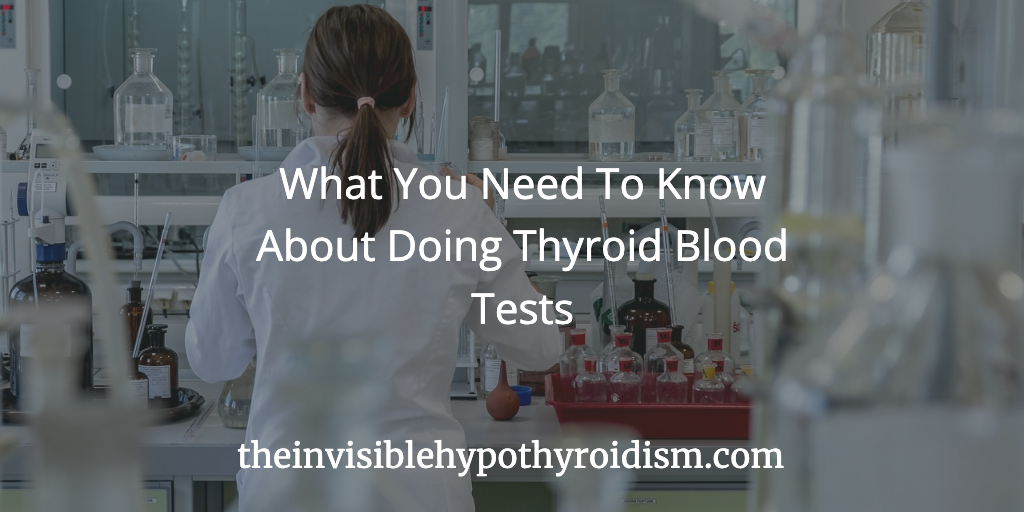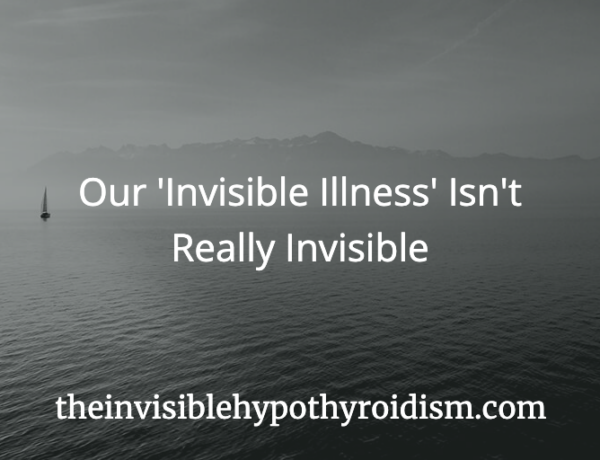Originally published on 30th May 2017 Last updated on 1st December 2023
Common questions about thyroid blood tests for those with medical conditions such as a thyroid disorder include:
- Do I take my thyroid medication as normal before the blood draw?
- Do you need to fast for thyroid blood work?
- How often should it be done?
- Does it need to be in the morning?
- Can it be done in the afternoon?
- Is fasting required for a TSH test?
- Can I have a thyroid blood test on my period?
- What should be tested?
If you feel overwhelmed by all these questions, it’s worth checking out my book which covers them all in a concise, easy-to-digest way.
Probably the most important thing to be aware of as someone with a thyroid condition, is whether you should take your thyroid medication before or after having any testing done.
When To Take Medication
T4-Only Meds
In regards to T4-only medication such as Levothyroxine and Synthroid, they only have a half-life of around five to nine days, which means that once you’ve become stable on a dose, it takes around a week for half of that dose to clear the body and blood levels to reflect this. This is why, when some people decide to stop taking it, they feel fine for the first week or so.
Therefore, whether you take T4-only medication right before your blood test or blood sample is taken, or haven’t taken it for up to two days beforehand, your TSH levels and Free T3 levels should still be the same, but free T4 may well show a peak two hours after taking T4 medications.
According to thyroidmanager.org:
“Serum T4 (Free T4) concentrations peak two to four hours after an oral dose and remain above normal for approximately six hours in patients receiving daily replacement therapy.” For this reason, thyroid expert Richard Shames, MD has the following recommendation: “I absolutely recommend that patients have any morning blood tests evaluating the thyroid before taking any thyroid medication. I have always told my patients to do it this way.”
The American Association of Clinical Endocrinologists (AACE) and The American Thyroid Association (ATA) Guidelines also state:
“In monitoring patients with hypothyroidism on L-thyroxine replacement, blood for assessment of serum free T4 should be collected before dosing because the level will be transiently increased by up to 20% after L-thyroxine administration. In one small study of athyreotic patients, serum total T4 levels increased above baseline by 1 hour and peaked at 2.5 hours, while serum free T4 levels peaked at 3.5 hours and remained higher than baseline for 9 hours.” [1]
So if you were to take your T4-only thyroid medication before a thyroid blood draw, your Free T4 levels could come out elevated, leading to your doctor lowering the medication dosage, when you don’t actually need it lowering.
However, in most cases, taking T4-only medication the morning of your test will not be an issue, as most doctors tend to adjust dosages according to TSH only, which shouldn’t be affected (although this is ideal. It should be adjusted based on the Free T3 and T4 levels too). But to get a reading of your Free T4 level that is reflective of most of the day (and something your doctor should also be testing, alongside TSH) you will need to hold fire on taking your medication until after the lab test.
T3 Meds
If you’re taking a thyroid medication that contains T3, such as NDT or T3 synthetic Liothyronine, it’s important to be aware that T3 has a half-life of around eighteen hours.
Straight after taking a T3 containing medication, the TSH level begins to fall and then stays suppressed for as long as five hours. Free T3 levels also increase after taking T3 medication and hit a peak after two and a half hours. [2]
Dr. Bianco, a thyroid doctor and scientist, reports in his book that after taking a tablet containing T3, it is rapidly absorbed into circulation, with a spike showing after 2-3 hours. He says that T3 can increase by as much as 50% after taking it. T3 returns to baseline levels around 20 hours after the dose.
This means that if you were to take your T3 containing thyroid medication before thyroid tests are done, your test results may imply that you are overmedicated when you are not, or even that your levels are within range or optimal, when you’re actually under-medicated. So it can affect your ability to get an accurate result and adjust your dosage accurately.
Therefore, you’re best to hold off taking this medication until after the blood draw. I take my thyroid medication with me so that I can take it straight after the blood test, otherwise I start to feel unwell by midday.
The bottom line is: you’ll get a more accurate result if you take any thyroid medications after the blood test.
Biotin
If you’re also one of the thyroid patients who take the supplement biotin, it is also worth knowing that it can cause falsely elevated thyroid levels on test results, making you look overmedicated or hyperthyroid when you’re not. Therefore, it is advised to not take it for at least 48-hours before a thyroid blood test.
Should I Fast for a Thyroid Test?
Do I have to fast for TSH blood work? Do thyroid blood tests require fasting?
In terms of fasting, most doctors tell thyroid patients that it’s not necessary to fast before a blood test. However, researchers have found that after eating, our TSH level becomes suppressed. [2]
This means that a high TSH could instead look much lower after eating, and borderline levels no longer borderline. As so many doctors use the TSH level to decide if a patient is adequately treated, or in need of more or less thyroid medication, this could result in patients having their thyroid medication wrongly altered, or even being told that their ‘borderline’ hypothyroidism is now ‘normal’, resulting in some thyroid patients being inadequately treated for their thyroid condition. All because they ate before their test.
Therefore, your TSH level is likely to be at its highest and most reflective of its underlying status, when tested after fasting, in the early morning.
Timing Matters
Another thing to keep in mind is the time at which your blood is drawn for thyroid testing.
Each time you have your thyroid tests done, you should aim for it to always be done at the same time, and under the same circumstances (i.e. fasting), so they’re as accurate and comparable as possible.
Given that you shouldn’t take your medication until after the draw, as early as possible in the morning and before 9am is preferable. This is because thyroid hormone levels have a circadian rhythm with a peak at night. Dr. Geracioti suggests that blood tests for hypothyroidism be done before 9am in order to not miss subclinical hypothyroidism and have as accurate results as possible. [4]
Does Being Ill Affect The Test?
Being unwell could affect test results temporarily. Sometimes, infections or a bout of an inflammatory condition can alter results until the illness resolves, so if you receive an unexpected result when unwell, it is probably wise to retest after you’ve recovered to rule it out.
Also, as diarrhoea can interfere with the absorption of your thyroid medication, this could affect your thyroid hormone levels and any testing.
Does Menstruation Affect Testing?
If you’re feeling particularly unwell from your period then you may wish to have blood drawn when you feel better. Especially if you already lose a lot of blood with menstruation. Heavy periods can be a symptom of hypothyroidism.
Thyroid expert, Dr. Alan Christianson, says that being on your menstrual cycle may change your thyroid levels, and that if you test in the middle of your cycle, you will not get the same results as at the beginning of your cycle. He suggests testing between days 1-9 of your cycle (day one being the first day of menstrual flow), or days 21-28, but not on days 10-20 of your cycle. [5]
If your periods are irregular, you can wait until the first week that they begin.
How Often?
In terms of how often you should be having your thyroid tests conducted, once every six to twelve months is standard if your levels are optimal and you feel well. Every two months is more common if you’re still adjusting dosage and having symptoms.
Many patients need their dosage altering as the weather gets colder, and again when it warms up, to reflect an increase or decrease in demand for thyroid hormone, due to external temperatures.
When first starting thyroid medication for hypothyroidism, most doctors recommend testing thyroid levels again about four to six weeks after the start of the treatment, to determine if the dose of medication is correct, but waiting eight weeks can allow the medication to finish building in the body and supply a more accurate reading.
When your thyroid gland isn’t working properly, thus leading to hypothyroidism, it’s incredibly important to correct the low levels of thyroid hormone with frequent and thorough testing.
What Should Be Tested?
A full thyroid panel (also known as a thyroid function test) is required to obtain the most comprehensive and accurate look at how you’re doing, as TSH alone and even TSH and Free T4 test without the other components of the thyroid panel, don’t give the full picture.
Free T3 and Thyroid Antibodies TpoAB and TgAB are important to monitor too. Many thyroid patients find that whilst their TSH is OK, their Free T3 and Free T4 are not optimal and so they still feel unwell. If your doctor won’t order the full thyroid panel, do know that it is relatively inexpensive and simple to order these tests yourself. Thyroid patients can order them from here and here.
TSH serves as an average read out over the previous four to six weeks of your thyroid levels but doesn’t give the most comprehensive view.
Do you follow these tips when you have blood drawn?

The book Be Your Own Thyroid Advocate: When You’re Sick and Tired of Being Sick and Tired, which builds on this article in detail and explains how to thrive with thyroid disease.
You can click on the hyperlinks in the above article to learn more and see references to information given, as well as the below links.
https://www.ncbi.nlm.nih.gov/pmc/articles/PMC5167556/
References:
[1] https://in.bgu.ac.il/en/fohs/communityhealth/Family/Documents/HYPOTHYROIDISM%20Guidelines%20ATA%20AACE%202012.pdf
[2] https://www.thyroidmanager.org/chapter/adult-hypothyroidism/#toc-9-8-1-pharmacology-of-thyroid-hormone-replacement-preparations1
[3] https://www.ncbi.nlm.nih.gov/pmc/articles/PMC4171896/
[4] http://www.schizophrenia.com/sznews/archives/004348.html#
[5] https://www.drchristianson.com/blog/when-test-thyroid/#6






